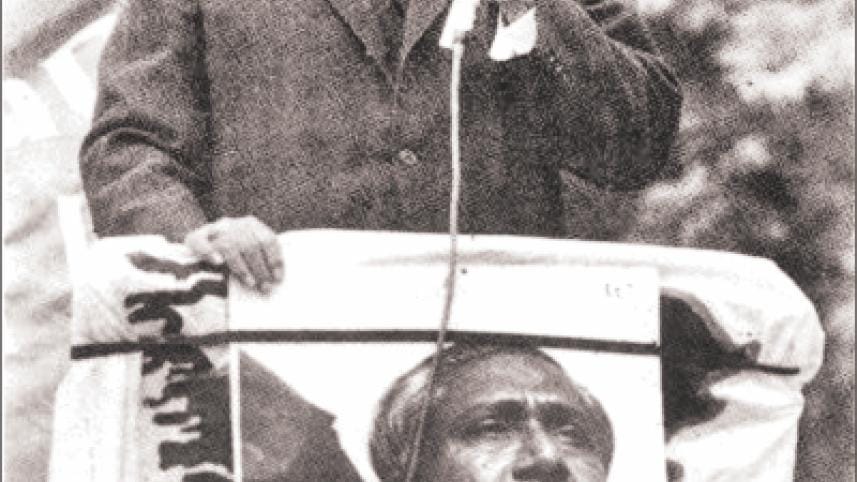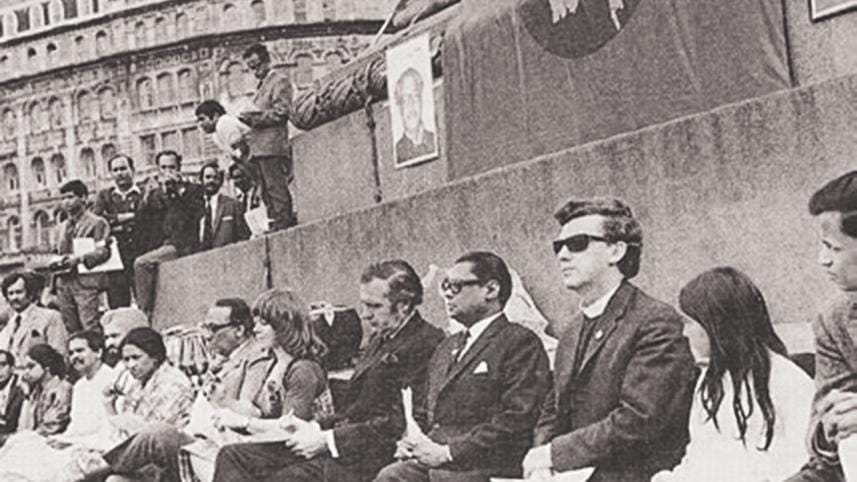Victory on the diplomatic front

Forty-four years have elapsed and it still perplexes me as to what led the Pakistan Army to unleash their dogs of war on their own citizens on the fateful night of March 25, 1971. A simplistic explanation could be that the overwhelming verdict of the people of Pakistan for reviving democracy was unacceptable to General Yahya Khan. When he realised that the Bangalee population of the country was not going to let him have his way, his fatuous and insane mindset convinced him that genocide would subjugate the people of Bangladesh. It took only a few days for Yahya to realise that the surgical solution he had sought was a monumental error of military strategy and political suicide. The irony was that General Yahya and Zulfiqar Ali Bhutto orchestrated the dismemberment of Pakistan by launching “Operation Searchlight”.
The secret telegram 1249 of April 10, 1971, from the US Consulate General in Dacca to Washington, entitled “Specific areas of dissent with current US policy toward East Pakistan”, summarised the causes and predicted the eventuality of the military action. To quote excerpts: “We (the Consulate) do not see issue as distinctly internal one. Aside from international moral obligations to condemn genocide… in defiance of geography, as well as ethnic and linguistic differences inveighing against unity of Pakistan, we continue to be blinded to reality of situation: people of East Pakistan want to live as free people of free country... they want to participate in deciding their own destiny. Even our forefathers fought for similar ideals… to us, an independent "Bangla Desh" is now inevitable”.
The axiomatic truth of diplomacy being the first line of defence was vindicated once again during the Liberation War of Bangladesh, only in this case diplomats away from the country and warriors in the battlefield fought hand in hand from the very beginning against the marauding Pakistani army. The guerilla warfare of the “Mukti Bahini” started from the word go but it was not the only adversary that the Yahya government would be up against. The Government in Islamabad woke up in a state of rude shock and dismay when on April 6, 1971, two brave and courageous Bangalee diplomats of the Pakistan Embassy in New Delhi, Mr. KM Shehabuddiun, Second Secretary, and Mr. Amjadul Haque, Assistant Press Attaché, defected and pledged their allegiance to the Government of the People's Republic of Bangladesh. The gruesome genocide of the night of March 25, 1971 moved them to decide that it would be treachery to serve a government of a country that had set its army to kill the very citizens they had taken an oath to protect. The digital “dotcom” world of today was not there in 1971. There were no smartphones or internet services for these brave diplomats to contact their colleagues or the political leaders to consult or seek guidelines. Nor were there any social media to raise global awareness. They were on their own, inspired by the call of Bangabandhu Sheikh Mujibur Rahman, to do whatever possible to create a global sensation.
Defection of diplomats is no ordinary matter and the world could not be indifferent to what caused them to make such a bold decision. The theatre of our Liberation War transcended international boundaries by the action of the two diplomats. It opened the floodgates for other Bangalee diplomats in different Pakistan embassies to emulate the action and defections that followed in a domino like manner. Mr. Mohammad Hossain Ali, the Deputy High Commissioner of Pakistan in Calcutta, took over the entire premises by raising the Bangladesh national flag. A similar show of courage was made by a young Third Secretary Mohiuddin Ahmed defecting from the Pakistan High Commission in London and the Vice Consul of Pakistan Consulate in New York, Mr. Mahmood Ali (the present Foreign Minister of Bangladesh). The situation took a dramatic turn with Pakistani Bangalee Ambassadors defecting and pledging their allegiance to the Government of Bangladesh. It would take a whole page and more to mention every individual of the brave Bangalee diplomats and Embassy officials who defected to pledge their allegiance to the Government of Bangladesh which was yet to receive recognition of the international community as an independent and sovereign state.
The Pakistani military junta did not envisage that the action of the Bangalee diplomats and defections in rapid succession would put the army and the foreign ministry in a state of shock. The offensive of our diplomats was primarily centered in New Delhi, Calcutta, London, Washington and New York. The Bangalee diplomats were tasked with onerous and formidable responsibilities.
First and foremost was to expose the atrocities and human rights abuses, genocide and war crimes committed by the Pakistani military junta that created a humanitarian crisis of unimaginable proportion, forcing millions to flee the country. The world needed to know the horror and magnitude of the disaster to neutralise possible diplomatic moves by Pakistan to have the issue defused as an internal affair of the country.
The second task was to launch a coordinated, comprehensive and convincing diplomatic offensive to approach governments and civil society stakeholders the world over, articulating our just and legitimate cause for independence and self-determination, and elicit diplomatic recognition of the international community.
The third was to form a Task Force under the leadership of Justice Abu Sayeed Chowdhury to lobby our cause in London, Washington and at the United Nations in Geneva and New York to convince the Member States that the existing state of Pakistan had self-destructed by resorting to a military action instead of seeking political reconciliation. Some of the brightest and most competent Bangalee professional diplomats of erstwhile Pakistan Foreign Service that included, inter alia, SAMS Kibria, Humayun Rasheed Chowdhury, Enayet Karim, and Abul Fatah were involved in this mission. Their commitment and determination notwithstanding, the access of the Bangalee diplomats to key positions of foreign governments was, however, limited as formal diplomatic recognition of the new state was still not forthcoming. What we needed was a trusted and influential ally. The country, whose security was most vulnerable and under threat by the military action in East Pakistan was India. It was in India's interest that the crisis be resolved soonest, and at the request of the high level political delegation of the Government of Bangladesh, India agreed to support our diplomatic offensive around the world and at the United Nations. India's Prime Minister Indira Gandhi took the lead along with stalwarts like Sardar Swaran Singh, Samar Sen, TN Kaul, DP Dhar, PN Haksar, MN Dixit, in underscoring the Bangladesh cause in their interactions with the international community. As a nation we will be small if we fail to recognise the unflinching support of the Indian political leaders, Indian diplomats and Indian Embassies around the world for their overarching outreach in 1971 to help us pursue our cause in the diplomatic front also.

Our Liberation War was fought when the Cold War was at its peak and international conflict resolution was, more than often, hostage to the East-West political divide. Pakistan, by virtue of its military alliances, was strongly supported by the US. India, on the other hand, was treated with suspicion by the US because of its close political relations and military cooperation with the Soviet Union. The debate on Bangladesh at the United Nations was caught in the imbroglio of the East-West ideological divide. The US and its allies of the West saw the crisis as an internal affair of Pakistan and pursued a ceasefire throughout the entire duration of the war to preempt the birth of the sovereign state of Bangladesh. China also took Pakistan's side on account of the chill in Sino-Indian relations since the 1962 war. Pakistan's role in facilitating the rapprochement between the US and the People's Republic of China in 1969, that paved the way for the latter to become permanent member of the UN Security Council, was a factor for sympathising with Pakistan. Pakistan's hopes were buoyed when the US had moved the US 7th Fleet and the USS Enterprise carrier group to the Bay of Bengal to intimidate India in November/December 1971. China was also reported to be amassing troops along NEFA for similar reasons. India might have partially called the US bluff and Chinese belligerency. However, with the Soviet Union also deploying its battle ships in the area and its military movement along the Sino-Russian border, whatever apprehensions India might have had abated. I believe that Pakistan was too naïve to seriously believe actual military intervention by US and China would take place when Pakistan had for all purposes, lost the war.
The Soviet Union, the only other superpower of the time, staunchly supported the Bangladesh cause by vetoing the ceasefire resolutions until the Pakistanis surrendered to the Allied forces of Bangladesh and India on December 16, 1971. The debate at the United Nations notwithstanding, Bangalee diplomats were successful in motivating global public opinion against the Pakistani propaganda that alleged that our liberation struggle was a secessionist war when in reality it was a legitimate struggle for self-determination. The spontaneous and generous help of expatriate Bangladeshi communities was also not to be undermined as they provided fillip to the diplomatic efforts to agitate the international media and human rights activists to sensitise the carnage and human rights abuses in East Pakistan and to exert pressure on their respective government to recognise independent Bangladesh. A large section of the American people and the US Senate as well as the British MPs openly came out in favour of recognising Bangladesh. With the pressure of global public opinion in favour of Bangladesh growing by the day, British, French and other western governments were increasingly softening their earlier positions on the ceasefire as was apparent by abstentions in the vote on the ceasefire resolution in the UN.
Zulfiqar Ali Bhutto's speech at the UN Security Council on 15th December 1971 was rhetoric of his own political aspirations of post-1971 Pakistan. The quoted excerpts will validate my premise: “For four days the Security Council has procrastinated. Why? Because the object was for Dacca to fall. That was the object… So what if Dacca falls? So what if the whole of East Pakistan falls? So what if the whole of West Pakistan falls? So what if our state is obliterated? … We will build a new Pakistan”. Bhutto's words were so prophetic! The Pakistan of 1947 was obliterated the following day when our victory was proclaimed with the surrender of the Pakistani army.
The entire nation is indebted to the Bangalee diplomats who risked everything to join the Liberation War. Their service was one of valour and I would urge the government to honour the living and the posthumous, to recognise the gallantry with which they fought the war of independence, in the most honourable and appropriate manner it deems fit.
The writer is a retired Ambassador.




 For all latest news, follow The Daily Star's Google News channel.
For all latest news, follow The Daily Star's Google News channel.
Comments